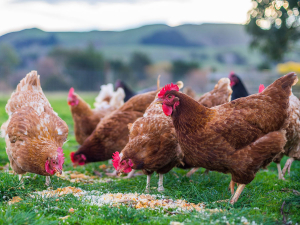Queensland Fruit Fly Movement Controls Lifted in Mt Roskill
Controls on the movement of fruit and vegetables in the Auckland suburb of Mt Roskill have been lifted.
 Biosecurity New Zealand has placed a second Otago farm on ‘a restricted place’ notice following the discovery of avian influenza in the region earlier this week.
Biosecurity New Zealand has placed a second Otago farm on ‘a restricted place’ notice following the discovery of avian influenza in the region earlier this week.
Biosecurity New Zealand has placed a second Otago farm on ‘a restricted place’ notice following the discovery of avian influenza in the region earlier this week.
The news comes as the culling of chickens in two sheds on a farm managed by Mainland Poultry begins.
Biosecurity New Zealand deputy director-general Stuart Anderson says the restricted place notice on the second farm, a small free-range farm located near Dunedin, is precautionary at this stage.
“As is normal in biosecurity responses we always investigate where illness is identified,” Anderson says.
The second property has approximately 6,000 birds, with a small number of deaths. Testing is currently underway.
Anderson says the cull at Mainland Poultry’s egg farm is being carried out by the business and supported by Biosecurity New Zealand.
“The cull is expected to take two to three days, using the existing industry standard practice of CO2 containerised gas, which farms regularly use to euthanise chickens,” he says.
“The carcasses, along with litter from the affected sheds, will be transported to a secure landfill in Southland, equipped to take this kind of waste,” he adds.
“The carcases will be loaded directly onto trucks with a leak-proof plastic lining, which has been thoroughly tested.
“It’s important to point out the landfill has specific features to prevent the leaching of materials into the environment, including impermeable layers, and a process of routine monitoring.
“The disposal will be in a deep pit and in an area well away from any public access, and the landfill will be closed during this process.”
Anderson says testing has been conducted at the smaller poultry farm near Dunedin.
That property is not owned by Mainland Poultry and he says Biosecurity New Zealand is investigating whether there are any links between the two properties.
He says testing is also being carried out on birds in the remaining sheds on Mainland Poultry’s egg farm and at other properties of interest.
“We will continue rigorous testing over the coming days and weeks and will take action as required,” Anderson says.
He says there had been no reports of concern about other ill or dead birds on other poultry farms.
“Contract tracing has revealed limited movements between Mainland Poultry’s affected farm and some of the other poultry farms in the area.”
Anderson says the risk to human health still remains low, with no concerns for food safety or wildlife.
“Avian influenza viruses are killed by cooking, so it remains safe to eat thoroughly cooked egg and poultry products,” he explains.
“Raw eggs have always been considered a high-risk food. Our advice remains not to consume or serve raw eggs, especially to those with low or compromised immune systems, as the eggs may contain harmful pathogens, including salmonella.”
The 10-kilometre buffer zone around Mainland Poultry’s egg farm will now be referred to as an enhanced surveillance zone.
Biosecurity New Zealand will be increasing its presence on the ground in Otago and has set up a regional control centre today to manage the situation.
“Over 100 staff across MPI, including frontline biosecurity, trade and market access, veterinarians, agriculture, communications, and food safety are contributing to the response and this number is increasing daily as required, both on the ground in Otago and in our operations centre,” he concludes.
Agrisea NZ has appointed Craig Hudson as it's new chief growth officer.
State farmer Landcorp, trading as Pamu, is a forecasting a full-year net profit of around $100 million.
Tony Aitken, chief executive of Ruralco, has been awarded the Excellence in Business Leadership Award at the ANZ Business of the Year Awards.
Global trade has been thrown into another bout of uncertainty following the overnight ruling by US Supreme Court, striking down President Donald Trump's decision to impose additional tariffs on trading partners.
Controls on the movement of fruit and vegetables in the Auckland suburb of Mt Roskill have been lifted.
Fonterra farmer shareholders and unit holders are in line for another payment in April.

OPINION: Here w go: the election date is set for November 7 and the politicians are out of the gate…
OPINION: ECan data was released a few days ago showing Canterbury farmers have made “giant strides on environmental performance”.